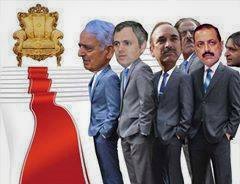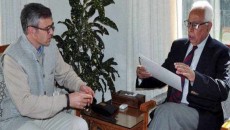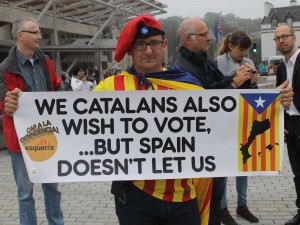Indian held Jammu and Kashmir has been placed under Governor’s rule.  Now BJP shall have more freedom to maneuver for installing a Hindu Chief Minster in IHK.The imposition of direct rule means local representatives will have no say in the running of IHK, at least for the time being.This development came after the two top runner parties, the Peoples Democratic Party (PDP) and Hindu nationalist Bharatiya Janata Party (BJP), failed to work out a power sharing arrangement or cut a deal with other smaller parties, The PDP won 28 seats in the Muslim dominated areas while the BJP won 25, mainly in the Hindu Jammu region.
Now BJP shall have more freedom to maneuver for installing a Hindu Chief Minster in IHK.The imposition of direct rule means local representatives will have no say in the running of IHK, at least for the time being.This development came after the two top runner parties, the Peoples Democratic Party (PDP) and Hindu nationalist Bharatiya Janata Party (BJP), failed to work out a power sharing arrangement or cut a deal with other smaller parties, The PDP won 28 seats in the Muslim dominated areas while the BJP won 25, mainly in the Hindu Jammu region.
Omar Abdullah, who suffered a backlash over his government’s handling of devastating floods in September, said it was vital the state not be left in “limbo”. “I am sorry after an election with such a good turnout we have a situation of Governor’s rule but as I’ve maintained the onus lies with PDP,” he said on Twitter. PDP spokesperson Nayeem Akhtar said that the party was still in discussions with a range of parties. “It might lead to a brief spell of governor’s rule but ultimately a popular government has to come and serve the state because the people have voted for the government,” Akhtar told NDTV.
Verdict of Kashmir elections has been fractured. What Kashmir needs is a representative Government, which respects the existing Constitutional provisions, especially Article 370. The dilemma for National Conference and Congress is in which direction to go for Government formation . BJP’s gaining electoral ground in Kashmir is a sign of aggressive policies to abolish article 370 and to bring in the agenda of Hindu Nation. During election campaign Modi and company had been talking in a clever way about article 370, while their intentions on the subject are very clear. Kashmir is standing on the cross roads. It has suffered a lot due to the militancy and the atrocities of Indian army in the valley. Dr Ghulam Nabi Fai has rightly argued in his recent article that: “In case the BJP is in the driver’s seat or in the driving car, the plight of Kashmir will worsen…The desire to possess Kashmir is nothing but a fantasy, an extremely poor business decision, and an outrageous ego trip. The people of Kashmir want what Pandit Jawaharlal Nehru, the Prime Minister of India wrote in his letter to the Prime Minister of Pakistan Liaquat Ali Khan on November 21, 1949, “I have repeatedly stated that as soon as peace and order have been established, Kashmir should decide of accession by Plebiscite or referendum under international auspices such as those of United Nations.” Ever since, all governments of India have made their utmost efforts to dilute the spirit of the letter, and to accomplish this Sheikh Abdullah and his biological descendents have willingly been tools in the hands of successive Union Governments.
. BJP’s gaining electoral ground in Kashmir is a sign of aggressive policies to abolish article 370 and to bring in the agenda of Hindu Nation. During election campaign Modi and company had been talking in a clever way about article 370, while their intentions on the subject are very clear. Kashmir is standing on the cross roads. It has suffered a lot due to the militancy and the atrocities of Indian army in the valley. Dr Ghulam Nabi Fai has rightly argued in his recent article that: “In case the BJP is in the driver’s seat or in the driving car, the plight of Kashmir will worsen…The desire to possess Kashmir is nothing but a fantasy, an extremely poor business decision, and an outrageous ego trip. The people of Kashmir want what Pandit Jawaharlal Nehru, the Prime Minister of India wrote in his letter to the Prime Minister of Pakistan Liaquat Ali Khan on November 21, 1949, “I have repeatedly stated that as soon as peace and order have been established, Kashmir should decide of accession by Plebiscite or referendum under international auspices such as those of United Nations.” Ever since, all governments of India have made their utmost efforts to dilute the spirit of the letter, and to accomplish this Sheikh Abdullah and his biological descendents have willingly been tools in the hands of successive Union Governments.
BJP is a part of the RSS or to say, Sangh Privar which wants to achieve greater Hindu Nation. It has become quite obvious during the last over six months of Modi government that the associated organizations of BJP are actively communalizing the society along religious lines. Emerging statements like: Gita as the national book; those not sons of ram are illegitimate settlers; and Godse was a nationalist are contrary to Indian constitution as well as prevalent national narrative. Aggressive campaigns for reconversion to Hinduism, opposing the film PK, on grounds that it promotes Jihad, have made it amply clear that BJP wants to make a fast transition towards Hindu Nationalism and impose Hindutva. In this quest, rights of religious minorities and Indian Constitutional values are its major target. What this mindset will give to the Kashmir as a state and Kashmiri people poses dilemmas for the BJP, Kashmiris, as well as India.
The article 370, in its original format, gave the special status to Kashmir, giving it autonomy in all the matters barring defense, communications, and currency and external affairs. RSS was totally opposed to it and it had demanded total merger of Kashmir in to India. RSS stuck to its guns and gradually under its pressure the clauses of autonomy started getting diluted. The major example was re-designating Prime Minister of Kashmir to Chief Minister and Sadar-e-Riyast to Governor. The prolonged militancy and intervention of Indian army, has added to the sour wounds of Kashmiri people.
While electoral campaign was on in IHK, two interesting things happened in the Europe. Long awaited referendums were held in Scotland and Catalans.
 Both were held in a peaceful manner, and the people decided according to their own free will whether or not to be independent nation. This was undoubtedly a victory for democratic principles and universal values. The people of Kashmir do not want anything more than that. They want the same principle to be equally applicable to Kashmir. Let the people decide. If it is up to the people of Scotland and Catalans to decide, as the Indian foreign minister says, then it should be up to the people of IHK to decide as well. All neutral reporters who have visited Kashmir say that the word referendum is common on the lips of Kashmiris and it stirs up excitement among them. Professor Richard Price, a well-known British historian says, “If Kashmir somehow secured a vote for its independence, the people would probably vote to secede.”
Both were held in a peaceful manner, and the people decided according to their own free will whether or not to be independent nation. This was undoubtedly a victory for democratic principles and universal values. The people of Kashmir do not want anything more than that. They want the same principle to be equally applicable to Kashmir. Let the people decide. If it is up to the people of Scotland and Catalans to decide, as the Indian foreign minister says, then it should be up to the people of IHK to decide as well. All neutral reporters who have visited Kashmir say that the word referendum is common on the lips of Kashmiris and it stirs up excitement among them. Professor Richard Price, a well-known British historian says, “If Kashmir somehow secured a vote for its independence, the people would probably vote to secede.”
Vote by Scots and Catalans are two instances in which people believed that their own uniqueness deserved not only autonomy but sovereignty. And while the Scottish referendum had legal force and recognition, the Catalonian referendum did not and was officially banned by the central government and its courts . Undoubtedly, with more than 80% voting in favor of independence, the matter will be given greater attention by Spanish authorities. Nevertheless, both proceeded without violence or relative interference from the central government. The balloting was conducted peacefully, which allowed people to voice their opinions without fear of reprisal. However, in Kashmir, which now, at least in theory, supposedly enjoys a semi-autonomous status as well, and has a several decades-old tradition of demanding a referendum, anyone who makes such an effort to hold a plebiscite would probably be executed on charges of sedition by the government. Arundhati Roy, the Booker prize-winning novelist of India, faced sedition charges in 2010 simply because she said, “the disputed territory of Kashmir is not an integral part of India.”
. Undoubtedly, with more than 80% voting in favor of independence, the matter will be given greater attention by Spanish authorities. Nevertheless, both proceeded without violence or relative interference from the central government. The balloting was conducted peacefully, which allowed people to voice their opinions without fear of reprisal. However, in Kashmir, which now, at least in theory, supposedly enjoys a semi-autonomous status as well, and has a several decades-old tradition of demanding a referendum, anyone who makes such an effort to hold a plebiscite would probably be executed on charges of sedition by the government. Arundhati Roy, the Booker prize-winning novelist of India, faced sedition charges in 2010 simply because she said, “the disputed territory of Kashmir is not an integral part of India.”
Kashmir and India share a common heritage, and yet both have their own unique qualities which make them different. It was for the very same reasons that when Britain gave India her independence that Pakistan was created as a separate country to give both Hindus and Muslims their own unique cultural identity and space. Kashmir was somehow caught in the middle, and was illegally acceded to India by its Maharajah against the wishes of its people and in violation of the rules governing the Partition of India. There is still great opportunity for peace in Kashmir, but it cannot occur unless the people of Kashmir are permitted to have their own identity and chart their own course. The Kashmir question is one of the oldest unresolved international problems in the world. The UN has to get involved actively to resolve this dispute. If historic experience is a guide, over more than 67 years, no bilateral talks between India and Pakistan have yielded agreements without the active role of an external element.
The Nation, January 12, 2015.
Disclaimer: The Views expressed are of the writer and are not necessarily reflective of IPRI policy.
